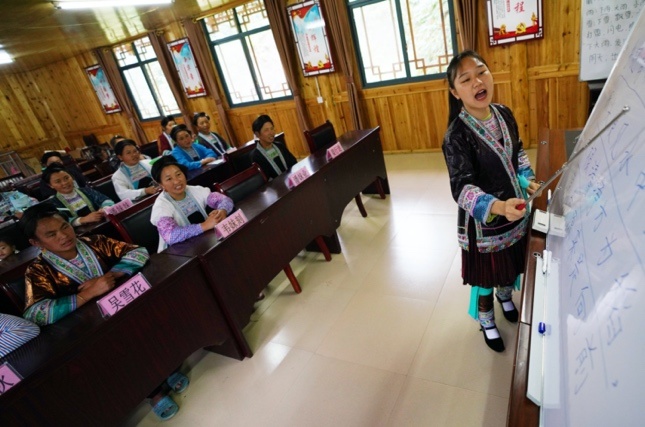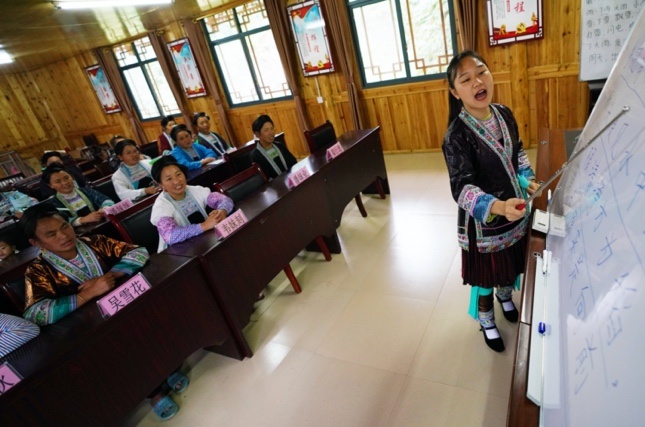By Zhao E'nuo, Wu Yue, People's Daily

College volunteer Liang Mengxiang teach local women Mandarin in Rongshui Miao autonomous county, Liuzhou, Southwest China's Guangxi Zhuang Autonomous Region on June 3. Photo by Long Linzhi/People's Daily Online
At present, about 80.72 percent of China's population speak Mandarin, and more than 95 percent of the literate population can use standardized Chinese characters.
The illiterate population accounted for over 80 percent when the People's Republic of China (PRC) was just founded, but now the proportion has been reduced to less than 4 percent. The language barriers hindering the communication among Chinese ethnic groups have almost been removed.
Since the founding of the PRC, the country has greatly advanced its popularization of standard Chinese language, which tremendously promoted the construction of national economy, as well as the development of education, science and culture. It played an irreplaceable role in upholding national unity and ethnic solidarity, improving the well-rounded development of the people, and enhancing the moral and ethical standards of the society.
To vigorously promote and popularize the standard spoken and written Chinese language is the core task of the language affairs in the new era. In recent years, China has made further efforts to promote Mandarin in rural areas, remote areas and ethnic-minority areas. The country enhanced bi-lingual education and training in ethnic-minority areas and rolled diversified measures to popularize Mandarin. These efforts yielded rich results, and have greatly improved the popularity of standard spoken and written Chinese language in ethnic minority areas.
"Mandarin is a 'road' for me, on which I can communicate with more people and thus improve my livelihood," said Yu Wulin, a farmer from Fugong county, Nujiang Lisu autonomous prefecture in Southwest China's Yunnan Province. "Using Mandarin helps me better understand the outside world, achieve better development and enjoy a better life," said Sonam Rinchen, an education worker from Gegye county, Ngari prefecture, Southwest China's Tibet Autonomous Region.
At present, the popularization of Mandarin is gaining speed in areas of extreme poverty, resulting in a constantly reducing number of impoverished residents unable to speak Mandarin, especially among the young laborers. Besides, the impoverished residents now have better communication capabilities in Mandarin, and stronger willingness to work or start businesses.
To inherit and promote the excellent language culture of the Chinese nation is a new measure of the language affairs in the new era, which is demonstrated by a series of data and projects in recent years.
The country launched a national Chinese classics recitation project, held Chinese classics contest, and distributed Chinese classics to grassroots units. The country gathered nearly 400 episodes of video resources about Chinese classics totaling 12,000 minutes, and organized online and in-person training sessions for over 10,000 teachers for recitation Chinese classics.
Language and cultural TV shows such as the Chinese Poetry Conference have been watched by over 3 billion times. In addition, China has initiated a protection program for Chinese language resources that collected and sorted Chinese dialects and minority languages in about 1,700 regions across the country.
China also built the world's largest language source base that gathers 123 languages and over 10 million pieces of data about Chinese dialects. It launched a project to spread key concepts in Chinese thought and culture worldwide, and started studies on Chinese oracle bone inscriptions. As a result, the Chinese oracle bone inscriptions have been included on the UNESCO Memory of the World Register. Last year, the country commemorated the 120th anniversary of the discovery of oracle bone inscriptions with a series of high-profile events.
Meanwhile, China is continuously enhancing language and cultural communication and cooperation. The Putonghua (Mandarin) Proficiency Test, after being implemented for over 20 years, has been participated by more than 120,000 people, training more than 1,000 Mandarin teachers for Hong Kong and Macao. China and its Taiwan province have launched cooperation to compile Chinese reference books since 2010. So far, nearly 10 dictionaries have been published, and a website about Chinese language has been launched.
In 2014, Suzhou Consensus was reached at the International Conference on Language. Four years later, the International Conference "Role of linguistic diversity in building a global community with shared future: protection, access and promotion of language resources" kicked off, during which the "Yuelu Proclamation" was adopted.
As of the end of 2019, over 60 countries have incorporated Chinese language in their national education system, and more than 80,000 schools have been offering Chinese language courses for over 25 million students. There are around 110 million people studying and using Chinese language outside China.
The illiterate population accounted for over 80 percent when the People's Republic of China (PRC) was just founded, but now the proportion has been reduced to less than 4 percent. The language barriers hindering the communication among Chinese ethnic groups have almost been removed.
Since the founding of the PRC, the country has greatly advanced its popularization of standard Chinese language, which tremendously promoted the construction of national economy, as well as the development of education, science and culture. It played an irreplaceable role in upholding national unity and ethnic solidarity, improving the well-rounded development of the people, and enhancing the moral and ethical standards of the society.
To vigorously promote and popularize the standard spoken and written Chinese language is the core task of the language affairs in the new era. In recent years, China has made further efforts to promote Mandarin in rural areas, remote areas and ethnic-minority areas. The country enhanced bi-lingual education and training in ethnic-minority areas and rolled diversified measures to popularize Mandarin. These efforts yielded rich results, and have greatly improved the popularity of standard spoken and written Chinese language in ethnic minority areas.
"Mandarin is a 'road' for me, on which I can communicate with more people and thus improve my livelihood," said Yu Wulin, a farmer from Fugong county, Nujiang Lisu autonomous prefecture in Southwest China's Yunnan Province. "Using Mandarin helps me better understand the outside world, achieve better development and enjoy a better life," said Sonam Rinchen, an education worker from Gegye county, Ngari prefecture, Southwest China's Tibet Autonomous Region.
At present, the popularization of Mandarin is gaining speed in areas of extreme poverty, resulting in a constantly reducing number of impoverished residents unable to speak Mandarin, especially among the young laborers. Besides, the impoverished residents now have better communication capabilities in Mandarin, and stronger willingness to work or start businesses.
To inherit and promote the excellent language culture of the Chinese nation is a new measure of the language affairs in the new era, which is demonstrated by a series of data and projects in recent years.
The country launched a national Chinese classics recitation project, held Chinese classics contest, and distributed Chinese classics to grassroots units. The country gathered nearly 400 episodes of video resources about Chinese classics totaling 12,000 minutes, and organized online and in-person training sessions for over 10,000 teachers for recitation Chinese classics.
Language and cultural TV shows such as the Chinese Poetry Conference have been watched by over 3 billion times. In addition, China has initiated a protection program for Chinese language resources that collected and sorted Chinese dialects and minority languages in about 1,700 regions across the country.
China also built the world's largest language source base that gathers 123 languages and over 10 million pieces of data about Chinese dialects. It launched a project to spread key concepts in Chinese thought and culture worldwide, and started studies on Chinese oracle bone inscriptions. As a result, the Chinese oracle bone inscriptions have been included on the UNESCO Memory of the World Register. Last year, the country commemorated the 120th anniversary of the discovery of oracle bone inscriptions with a series of high-profile events.
Meanwhile, China is continuously enhancing language and cultural communication and cooperation. The Putonghua (Mandarin) Proficiency Test, after being implemented for over 20 years, has been participated by more than 120,000 people, training more than 1,000 Mandarin teachers for Hong Kong and Macao. China and its Taiwan province have launched cooperation to compile Chinese reference books since 2010. So far, nearly 10 dictionaries have been published, and a website about Chinese language has been launched.
In 2014, Suzhou Consensus was reached at the International Conference on Language. Four years later, the International Conference "Role of linguistic diversity in building a global community with shared future: protection, access and promotion of language resources" kicked off, during which the "Yuelu Proclamation" was adopted.
As of the end of 2019, over 60 countries have incorporated Chinese language in their national education system, and more than 80,000 schools have been offering Chinese language courses for over 25 million students. There are around 110 million people studying and using Chinese language outside China.
 Menu
Menu
 Over 80 percent of Chinese population speak Mandarin
Over 80 percent of Chinese population speak Mandarin
















